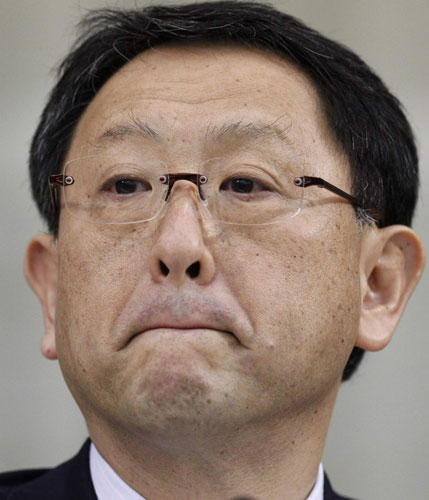Asia-Pacific
Toyota: Car production disrupted until Nov or Dec
(Agencies)
Updated: 2011-04-22 17:15
 |
Large Medium Small |
 |
|
Toyota Motor Corp President Akio Toyoda attends a news conference in Tokyo April 22, 2011. [Photo/Agencies] |
TOKYO - Toyota said Friday its global car production, disrupted by parts shortages from Japan's earthquake and tsunami, won't return to normal until November or December - threatening its spot as the world's top-selling automaker.
President Akio Toyoda apologized to customers in a statement for the delays due to the twin disasters that damaged suppliers in northeastern Japan and affected automakers around the world.
"To all the customers who made the decision to buy a vehicle by us, I sincerely apologize for the enormous delay in delivery," Toyoda said in a statement released before a press conference.
Toyota Motor Corp. said the March 11 disasters have already caused a production loss of 260,000 cars. Earlier this week, it resumed car production at all of its plants in Japan for the first time since the quake, but the factories will run at half capacity due to parts shortages.
The setbacks could cause Toyota to lose its top position in the global auto industry.
Last year, Toyota sold 8.42 million vehicles, barely keeping its lead over a resurgent General Motors Co., which sold 8.39 million, thanks to booming sales in China.
Now with Toyota's production problems, GM could overtake the Japanese automaker this year, reclaiming the title of world's largest automaker that it lost in 2008.
The parts crunch, meanwhile, has been felt around the world, from Malaysia to the UK to the United States. Nissan Motor Co. and Ford Motor Co. have said several North American plants would be closed for some of April, and Chrysler CEO Sergio Marchionne has said his company will see disruptions.
Toyota Motor Corp. has extended production cuts at its North American factories into early June, a move that will likely result in widespread model shortages. Its factories in China are also operating at 50 percent capacity.
The company has pledged not to lay off any of its 25,000 workers in North America and says it will use the extra time for training to make improvements at its 13 factories in the region.
In his statement, Toyoda said the automaker had sent workers into the disaster zone to help factories, dealers and suppliers recover, and was confident they would contribute to a "quicker recovery" of production.
| 分享按钮 |